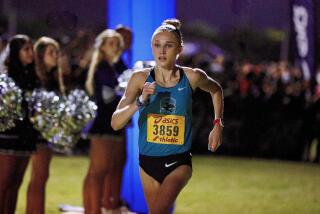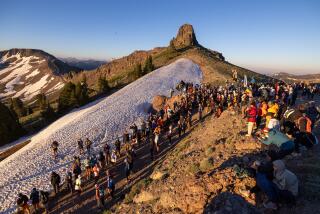World Bests Highlight Carlsbad 5K : Scott and McColgan Win Their Races With Record Times
- Share via
CARLSBAD — For the second time in three years, a Carlsbad 5,000-meter road race produced two world bests Sunday.
That was nothing new for Fallbrook’s Steve Scott, winner of the men’s division. He set the previous record in the inaugural race in 1986. Liz McColgan, the women’s winner from Dundee, Scotland, is no stranger to road racing bests, either. She holds the world 10-kilometer mark as well.
Both Scott and McColgan had to sprint hard in the last 50 yards to finish in record time and win the $5,000 first-place prize money. They each received an extra $1,000 for breaking the records.
Scott, who has won both previous Carlsbad races, finished in 13 minutes, 30.2 seconds, beating the old record of 13:31.9.
McColgan finished in 15:29.7. The previous record was 15:30.2 set by Patti Sue Plummer here in ’86.
For Scott, the race showed that he is closer to achieving his goal of qualifying for the U.S. Olympic team--and putting a disastrous 1987 season behind him--than he had thought. It also proved that, at 31, he can still put on a good show in front of the hometown fans, about 8,000 of whom lined the course Sunday.
For McColgan, it was just another world road-racing best, her second in two months.
McColgan (formerly Liz Lynch) led from the start and beat some pretty good runners, 1987 champion Lorraine Moeller of New Zealand (15:40) and Mary Knisely of Dallas (15:43), the Pan American Games 3,000-meter champion.
But she was not impressed with her time or victory.
“It’s always good to break a record, but it’s not a great record,” said McColgan, 23, who ran a world road best 30:59 for 10 kilometers in February. “The record should be 14:30, or so. You could probably go under 15 minutes if you had the right people here. I have run 15 (minutes) on the track and I did that on my own.
“To be realistic, Grete (Waitz) and Ingrid (Kristiansen) are the only ones who are going to run at my pace. If you got somebody to pace you, OK. But the first mile is OK. You can run that on your own. It’s the second mile that that begins to hit you. That’s where you slow down. Today, I did it on my own.”
Pacing himself was never a problem for Scott. He had plenty of company most of the race.
He was seventh after the first mile. Marcos Barretto of Mexico City, who finished second at 13:34, and Matthews Motshwarateu of Botswana, third at 13:35, ran a blistering 4:14 for the first mile.
Scott moved up to third about a mile and half into the 3.1-mile race and pulled away from the pack at about the 2 1/2-mile mark with Barretto.
The two stayed together for about half a mile. But about 250 yards before the finish, Scott made his move.
As Scott turned the corner onto Elm Avenue, the crowd let out a big roar. Scott said that helped him find the energy to sprint those last few yards. But that wasn’t the only reason.
“I saw the clock was at 13:23,” Scott said. “I hadn’t seen what my time was before that. If I kept going at the same pace, I wouldn’t have gotten the record. I wish I had better vision.
“I’m just thankful the race is in my back yard. There were a lot of times that I really felt the crowd, and that final stretch was one of them. I think that had more to do with my winning than my ability.”
Barretto, who finished second at 13:34, didn’t buy that.
“The fast pace helped him more than than the people did,” he said. “Scott won because of his ability.”
Scott, America’s best miler over the last decade, barely made it out of the semifinals of the 1,500 meters at the World Championships in Rome and then finished last in the final. What’s more, he was bothered by tendinitis in his left hamstring during 1987.
“Nothing went right except Carlsbad,” he said.
Scott is no longer bothered by tendinitis, but he still had been disappointed after finishing sixth at 29:05 in a 10-kilometer road race in Los Angeles two weeks ago.
“I haven’t done much speed work,” Scott said. “I’ve only had two weeks of intervals (training). I was a little concerned that it was too little, too late against this field. I thought I was capable of running 13:35, 13:40. I didn’t anticipate running that fast today.”
Since the speed was there when he needed it, Scott remains hopeful about the rest of the season, one that he hopes will end with a medal in the 1988 Summer Olympics in Seoul.
“I’m taking this year one race at a time,” he said. “It’s like a ladder. When you have a good race, you feel good about your performance, good about yourself, and that carries you into the next race. I wouldn’t be saying that if ’87 wasn’t so bad.”
McColgan was not worrying about how Sunday’s race affected her season, not with her kind of confidence.
In fact, she is looking ahead to a 10-kilometer race on the island of Bali in Indonesia in two weeks. Last year, she beat Kristiansen in the race. This weekend, Kristiansen won the World Cross-Country championships in Auckland, New Zealand.
After that, McColgan said she plans to concentrate on running in the trials for the British 3,000-meter team, even though she hoping to run in the 10,000 in the Olympics.
But Moeller said McColgan is not unbeatable. She may have won by 10 seconds, Moeller said, but . . .
“There were times when I felt like I could catch her,” said Moeller, who is hoping to qualify for the New Zealand Olympic marathon team. “She gained maybe 10 or 15 seconds in the first half mile or so, but then she wasn’t going that fast. It was good for me to realize that Liz McColgan is not that far ahead of me.
“I think it is not so much physical ability as it is a mind set that sets her and Grete and Ingrid apart.”
Ed Eyestone of Orem, Utah was fourth at 13:39. San Diego’s Terry Cotton was 9th at 13:52.
More to Read
Go beyond the scoreboard
Get the latest on L.A.'s teams in the daily Sports Report newsletter.
You may occasionally receive promotional content from the Los Angeles Times.






